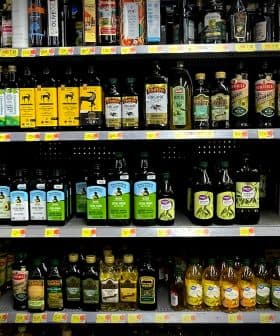Blended Oils 'Bad for Transparency'
The chairman of the European Commission’s Advisory Group on Olives and Derived Products warned that products blending olive oil with other vegetable oils could harm quality and transparency in the sector, while Spain, Italy, Portugal, and Greece continue to ban such blends for sale within their borders. Despite EU regulations allowing blends of olive oil and other vegetable oils, Spain prohibits local production of such blends for domestic consumption, citing difficulties in testing the contents and risks to quality and transparency in the olive oil sector.

Products offering a mix of olive oil and other vegetable oils risk undermining quality and transparency in the olive oil sector, according to the chairman of the European Commission’s Advisory Group on Olives and Derived Products.
See Also:Greek Proposal to Mix Oils a ‘Cause for War’
Spain’s Rafael Sánchez de Puerta said while most of the rest of the world allows such blends, he hopes Spain, Italy, Portugal and Greece will continue to ban companies from making them for sale within their borders.

OECD claimed Spain already allowed blends
Sánchez, director general of FAECA, the Andalusian Federation of Agricultural Cooperative Enterprises, was commenting in the wake of an Organization for Economic Co-operation and Development (OECD) competition report on Greece recommending the country allow olive oils blended with other vegetable virgin oils to be produced and sold by Greek producers for the domestic market.
“Other Mediterranean countries (such as Spain) with a long-established olive oil tradition do not apply a similar restriction and hence are more competitive on the international market. It is our view, therefore, that this provision prevents Greek producers from competing in the domestic market against cheaper imported blended oils (for frying, for instance),” it said.
Hard to prove what’s really in a blend
But Sánchez said that Spain continued to ban local production of such blends for domestic consumption. He hopes it will continue to do so because“it’s very difficult to test what’s really in such oils. And as olive oil is more expensive than other oils there is always the temptation to take advantage of its image yet to include just a small percentage of it.” This risks undermining important efforts to promote quality and transparency in the olive oil sector, he said.
EU rules on hybrid oils
As stated in the OECD report, blends of olive oil and other vegetable oils are not banned in the EU. But regulation 29/2012 on marketing standards for olive oil does allow member states to stop them being produced within their territory where the production is for domestic consumption.
However, they can’t ban sales of such blends in their territory if they come from other countries, and nor can they ban production of such blends in their territory for export.
The EU regulation also says that the presence of olive oil can be highlighted by images or graphics on the labeling of a blend only if it accounts for more than half of the blend.
Two olive oil blends among Walmart’s best sellers
Spain’s Borges brand tested the water in 2005 with Borgefrit, composed of 85 percent sunflower oil and 15 percent extra virgin olive oil — a product the relevant regional government authority, the Catalan Agriculture Department, promptly said could not be sold in Spain.
Meanwhile world olive oil leader Deoleo — active lately with trade mark applications for both its Carbonell and Koipe brands — hinted it would like to include blends among new products it says it will soon launch.
During discussion last November of its new focus on health, it cited as an example of demand that risk of cardiovascular problems applies to 81 percent of men in India, a country where Dalmia Continental — recently bought by Cargill — said in November it also planned to launch a blend formed by rice bran oil and 30 percent olive oil to join blends already sold in that market.
Among hybrid oils in the United States are the Pompeian OlivExtra canola and extra virgin olive oil blend and Smart Balance Cooking Oil, a mix of canola, soy and olive oils, which Walmart list as among their 13 best-selling olive oils.






